450+ 5 Letter Words Ending with “A” List, Meaning, PDF
The 5-letter words ending with ‘A’ is undeniable, weaving a tapestry of linguistic diversity that spans cultures, languages, and meanings. These words, often rich in vowel sounds, carry a musicality and rhythm that resonate well beyond their brief compositions. They encapsulate a wide range of concepts, from exotic places to common names, and from scientific terms to everyday objects, offering a fascinating glimpse into the vastness of language. Whether you’re a word game aficionado, a budding linguist, or simply a lover of words, delving into this collection promises a journey filled with discovery, inspiration, and the joy of uncovering new and intriguing terms.
300+ Most Commonly Used 5 Letter Words Ending with “A”
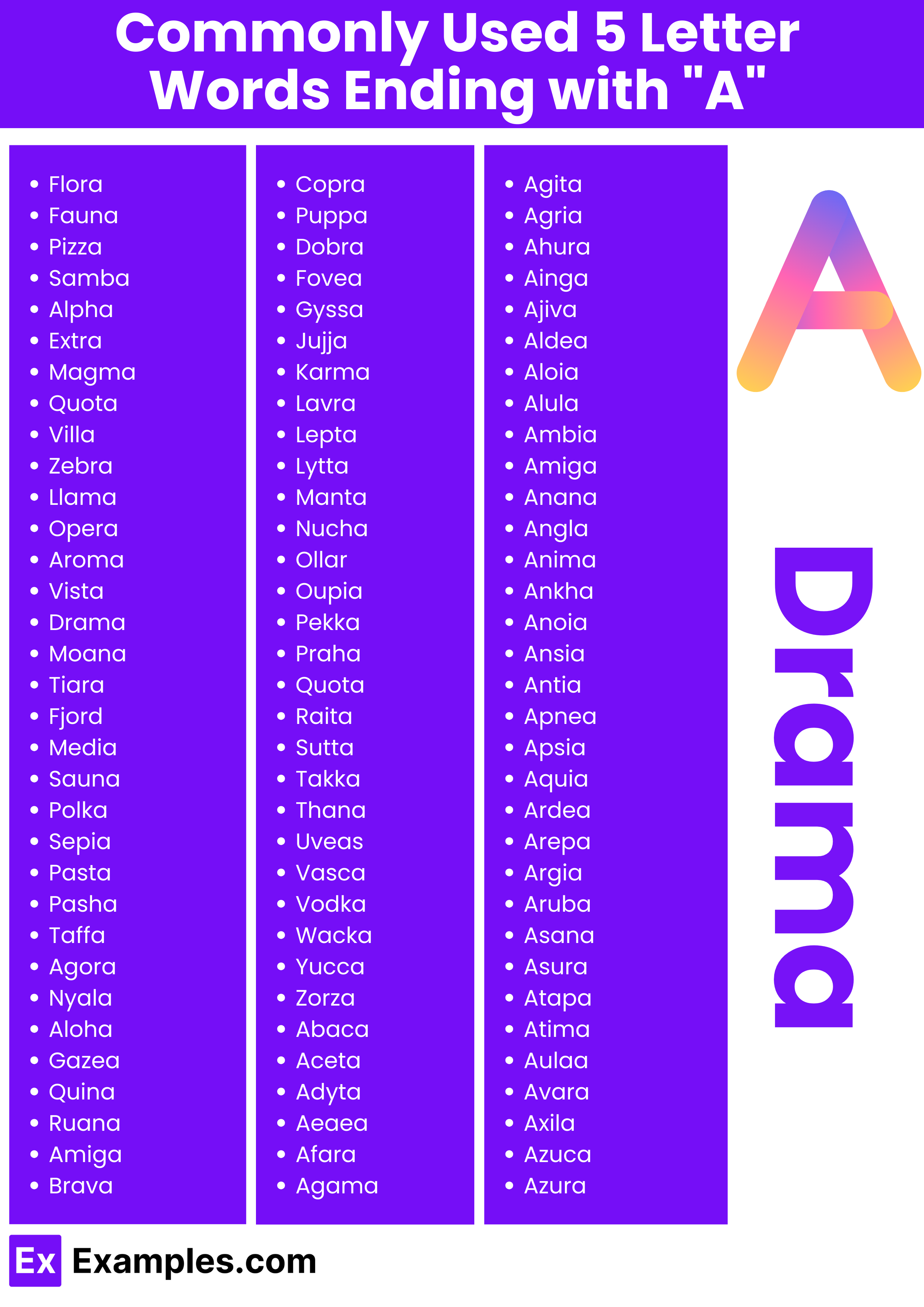
Delving into the realm of 5-letter words ending with “A” offers a unique glimpse into the versatility and richness of the English language. This particular set of words spans various domains, including nature, geography, emotions, and technology, reflecting the breadth of human experience and knowledge. From the natural world’s “Flora” and “Fauna” to the culinary delight of “Pizza” and the rhythmic “Samba,” each word carries its own flavor and context. Educators and students can greatly benefit from this compilation, as it not only enriches vocabulary but also provides a diverse toolkit for expression and understanding. These words are bridges between cultures, disciplines, and ideas, highlighting the interconnectedness of our world. Engaging with this collection can enhance comprehension, improve communication skills, and foster a deeper appreciation for the nuances of language.
| Flora | Fauna | Pizza | Samba |
|---|---|---|---|
| Alpha | Extra | Magma | Quota |
| Villa | Zebra | Llama | Opera |
| Aroma | Vista | Drama | Moana |
| Tiara | Fjord | Media | Sauna |
| Polka | Sepia | Pasta | Pasha |
| Taffa | Agora | Nyala | Aloha |
| Gazea | Quina | Ruana | Amiga |
| Brava | Copra | Puppa | Dobra |
| Fovea | Gyssa | Jujja | Karma |
| Lavra | Lepta | Lytta | Manta |
| Nucha | Ollar | Oupia | Pekka |
| Praha | Quota | Raita | Sutta |
| Takka | Thana | Uveas | Vasca |
| Vodka | Wacka | Yucca | Zorza |
| Abaca | Aceta | Adyta | Aeaea |
| Afara | Agama | Agita | Agria |
| Ahura | Ainga | Ajiva | Aldea |
| Aloia | Alula | Ambia | Amiga |
| Anana | Angla | Anima | Ankha |
| Anoia | Ansia | Antia | Apnea |
| Apsia | Aquia | Ardea | Arepa |
| Argia | Aruba | Asana | Asura |
| Atapa | Atima | Aulaa | Avara |
| Axila | Azuca | Azura | Badia |
| Baiza | Barca | Basha | Basta |
| Batia | Bavsa | Bayou | Beisa |
| Benna | Beria | Betta | Biala |
| Bimba | Binna | Bocca | Bonza |
| Borla | Braca | Brava | Breda |
| Bursa | Butta | Cacta | Caffa |
| Cakra | Calpa | Camia | Canoa |
| Capta | Carma | Casba | Cebua |
| Ceiba | Cella | Chica | Chola |
| Cilia | Cimia | Cippa | Circa |
| Clava | Cobea | Cocca | Colza |
| Comma | Copra | Corva | Costa |
| Cotta | Coupa | Covia | Craal |
| Crura | Cumba | Curia | Cutla |
| Cygna | Dacha | Daman | Danza |
| Darba | Dataa | Davia | Deata |
| Degma | Delba | Derma | Desna |
| Dewar | Dhyaa | Dicca | Digna |
| Diksa | Dobra | Dolma | Donza |
| Dorsa | Douma | Draba | Dreda |
| Drona | Drova | Drupa | Ducca |
| Ducta | Dulia | Dumas | Dunna |
| Durra | Duska | Duvia | Dwama |
| Dyula | Eclat | Edema | Egmaa |
| Eland | Elata | Emdaa | Emesa |
| Enova | Ephas | Epula | Equia |
| Erato | Erbia | Ergma | Erupt |
| Escar | Eskar | Etana | Ethna |
| Etnaa | Eupha | Exuma | Eyraa |
| Faena | Fanga | Fatah | Fatwa |
| Favla | Fella | Femta | Festa |
| Fibra | Ficua | Fidia | Filla |
| Finca | Flota | Folia | Forza |
| Fossa | Frana | Friza | Frota |
| Fucsa | Fulwa | Furia | Fuska |
| Gamba | Gamla | Ganda | Ganza |
| Garua | Gassa | Gauda | Gaura |
| Gazza | Gelia | Genoa | Gesta |
| Ghata | Ghyll | Gibba | Gilda |
| Ginza | Gipon | Girth | Gisla |
| Gluma | Gnawa | Gonia | Gonza |
| Goura | Grada | Grana | Graza |
| Greca | Grita | Groma | Grupa |
| Guana | Guara | Gubba | Guisa |
| Gular | Gumma | Gunya | Gurra |
| Gusha | Gusta | Gutta | Guzla |
| Gynea | Gynia | Gyros | Gytha |
| Hadda | Hadia | Hafsa | Haika |
| Halma | Hamza | Hanja | Hapla |
| Harba | Harka | Harpa | Harta |
| Hasta | Hatia | Haula | Hauyn |
| Havza | Hawla | Hecia | Hedda |
| Hegra | Helia | Hemba | Henna |
| Herma | Hespa | Heths | Hiant |
| Hibla | Hidra | Higra | Hilal |
| Himba | Hinna | Hinta | Hipha |
| Hirka | Hissa | Hitra | Hitta |
| Hoega | Hogla | Hokka | Holla |
| Holma | Honka | Hopla | Horah |
| Hosha | Hossa | Hosta | Hotta |
| Hovas | Howea | Hryvn | Huala |
| Huari | Hubba | Hucca | Hudna |
| Huffa | Hugga | Hulda | Hully |
| Humma | Hunda | Huppa | Hurra |
| Husna | Huzza | Hwyla | Hybla |
| Hymen | Hypha | Ibera | Ibota |
| Icica | Ictus | Idgah | Idola |
| Iduma | Ijmaa | Ikara | Iliad |
| Ilkka | Illia | Imama | Imbwa |
| Impia | Inaja | Incha | Indha |
| Indra | Ingan | Ingle | Ingra |
| Iniga | Inkar | Inoma | Intra |
| Invia | Ionia | Iotas | Irida |
| Ishta | Islar | Isswa | Istle |
| Itala | Itcha | Ituha | Ixtla |
| Izara | Izbaa | Jabia | Jacia |
| Jadra | Jaffa | Jagla | Jahva |
| Jaina | Jajma | Jaksa | Jalpa |
| Jamna | Jania | Jansa | Japta |
| Jarra | Jarta | Jasma | Jatha |
| Jatka | Jaula | Jazza | Jebba |
| Jeeda | Jehla | Jelab | Jemma |
| Jenga | Jenka | Jepha | Jerba |
| Jespa | Jeths | Jhala | Jhula |
| Jibba | Jidda | Jigga | Jilha |
| Jimba | Jinja | Jirga | Jitta |
| Jivya | Jobba | Jocsa | Jodha |
| Jogia | Johra | Jokha | Jolla |
| Jolza | Jompa | Jonna | Joola |
| Joppa | Jorba | Jorra | Jotha |
| Joual | Jougs | Joule | Jowar |
| Jubha | Jucha | Judda | Jukka |
| Julfa | Jumma | Junga | Junta |
| Jurat | Jussa | Justa | Juwta |
| Juzza | Kabaa | Kabra | Kacha |
| Kadai | Kaffa | Kafir | Kagna |
| Kahwa | Kaima | Kajia | Kakka |
| Kalpa | Kamba | Kamea | Kamia |
| Kamra | Kanfa | Kangs | Kanha |
| Kanja | Kapta | Karba | Karha |
| Karia | Karla | Karna | Kasha |
| Kasra | Katas | Katha | Katpa |
| Kauri | Kauta | Kavas | Kawas |
| Kazza | Kebab | Kedah | Keema |
| Keita | Kelia | Kemba | Kenaf |
| Kenna | Kerma | Kerra | Kesha |
Most Trending 5 Letter Words Ending with “A”

In the ever-evolving landscape of language, certain 5-letter words ending with “A” have surged in usage, mirroring contemporary trends, cultural shifts, and technological advancements. These words, vibrant and resonant, enrich dialogues, writings, and discourses across various platforms. For educators aiming to connect with students on a contemporary level, integrating these trending terms can make learning more relatable and engaging, fostering a dynamic educational environment that resonates with the zeitgeist.
- Media – Channels of communication.
- Flora – Plant life of a region.
- Fauna – Animal life of a region.
- Vista – A pleasing view.
- Quota – A prescribed number.
- Extra – Beyond the usual.
- Salsa – A type of Latin American dance.
- Llama – A South American mammal.
- Fjord – A long, narrow inlet with steep sides.
- Agave – A succulent plant.
- Cobra – A venomous snake.
- Balsa – A lightweight wood.
- Villa – A luxurious country residence.
- Magma – Molten rock beneath the earth’s surface.
- Zebra – An African wild horse with black-and-white stripes.
- Ultra – Extreme.
- Aroma – A distinctive smell.
- Drama – A play for theatre, radio, or television.
- Plaza – A public square.
- Sepia – A brownish tone.
- Lyric – Expressing the writer’s emotions.
- Mania – Excessive enthusiasm.
- Tibia – The inner and larger bone of the lower leg.
- Sonar – A system for detecting objects under water.
- Alpha – The first in a series.
- Chica – A young woman (informal).
- Pasta – A dish originally from Italy.
- Tiara – A jeweled headband.
- Samba – A Brazilian dance.
- Stoia– It is a Romanian word.
New & Latest Added 5 Letter Words Ending with “A”

Exploring new and recently added 5-letter words ending with “A” can significantly enrich the vocabulary of students and educators alike. This compilation is specifically designed to introduce teachers to the latest additions in the English language, fostering an environment of continuous learning and curiosity. Each word is carefully selected for its relevance and potential to enhance communication skills, complete with a brief definition to ensure understanding and facilitate integration into daily vocabulary.
- Tikka – A type of South Asian dish made with marinated pieces of meat.
- Quota – A fixed share or portion that is allocated.
- Nyala – A type of African antelope with spiral horns and marked with white stripes.
- Mocha – A coffee drink with chocolate, or a port city in Yemen known for its association with coffee.
- Linga – An alternative spelling of ‘lingam’, a symbol representing the Hindu deity Shiva.
- Koala – An arboreal Australian marsupial known for its teddy bear-like appearance.
- Joual – A dialect of Canadian French, spoken primarily in Quebec.
- Ihram – A state of sanctity that Muslims must enter before performing the Hajj or Umrah.
- Henna – A dye prepared from the plant Lawsonia inermis, used for coloring the skin and hair.
- Grana – Hard, mature cheeses from Italy, known for their grainy texture.
- Fovea – A small depression in the retina where visual acuity is highest.
- Etnas – A plural form of ‘Etna’, referring to multiple instances related to the volcano in Sicily.
- Dobra – The currency unit of São Tomé and Príncipe.
- Cobia – A large edible fish found in warm waters.
- Bursa – A fluid-filled sac or saclike cavity, especially one countering friction at a joint.
- Areca – A genus of single-stemmed palms, including the betel palm.
- Zebra – An African wild horse with distinctive black-and-white striped coats.
- Yucca – A plant with stiff, sword-like leaves and clusters of white, bell-shaped flowers.
- Xenia – The effect of the pollen from one plant on the seeds of another.
- Wazza – Slang for a skilled or notable person in a particular field or activity.
- Vulva – The external female genital organs.
- Ulama – A body of Muslim scholars recognized as having specialist knowledge of Islamic sacred law and theology.
- Tofua – A volcanic island in the Pacific Ocean, part of Tonga.
- Sufia – A name associated with wisdom and mysticism, often found in Islamic cultures.
- Rufiy – An alternative spelling for ‘Rufiyaa’, the currency of the Maldives.
- Quena – A traditional flute of the Andes, made of cane or wood.
- Puppa – An alternative or playful spelling of ‘pupa’, the life stage of some insects.
- Okada – A term used in West Africa for commercial motorcycles used as taxis.
- Noria – A water wheel with buckets attached, used for raising water.
- Magma – Molten or semi-molten natural material from which all igneous rocks are derived.
Noun 5 Letter Words Ending with “A”
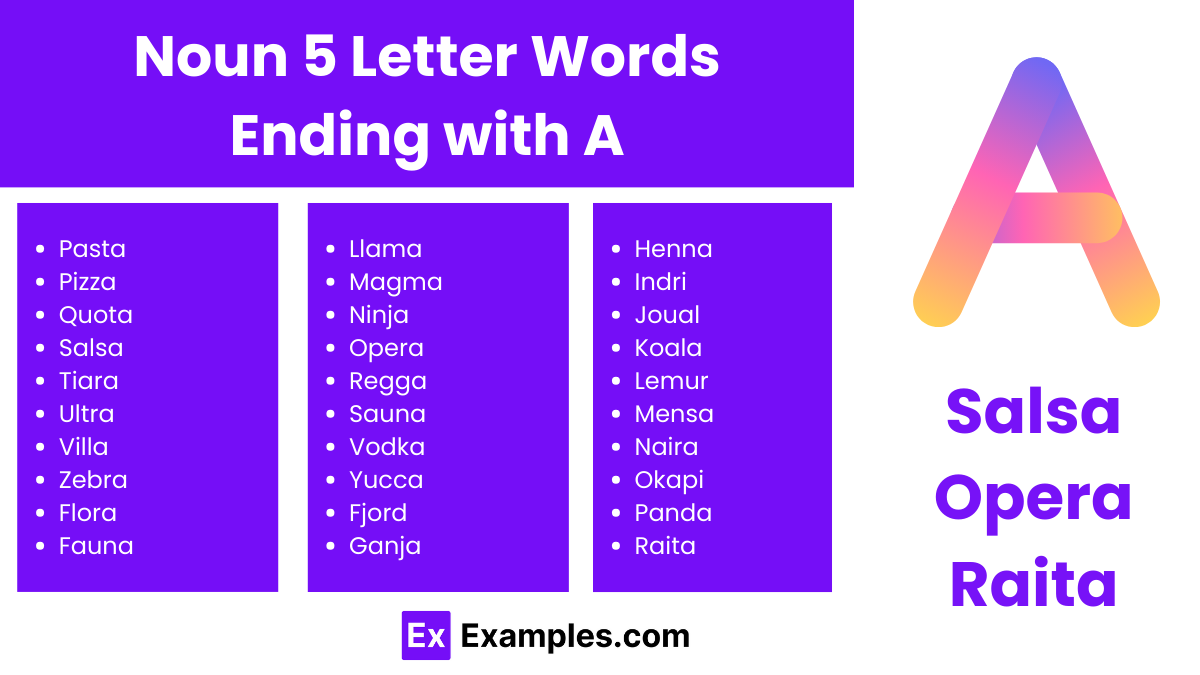
Nouns are the cornerstone of language, naming everything from tangible objects to abstract concepts. This collection of 5-letter nouns ending with “A” spans a diverse range of subjects, enriching our vocabulary and enabling precise and varied expression. For educators, these nouns offer a means to broaden students’ linguistic horizons, enhancing their ability to describe the world around them with clarity and richness.
- Pasta – A type of Italian noodle.
- Pizza – A popular Italian dish.
- Quota – A fixed share or limit.
- Salsa – A type of dance or sauce.
- Tiara – A jeweled crown.
- Ultra – An extremist.
- Villa – A large house.
- Zebra – A striped animal.
- Flora – Plant life.
- Fauna – Animal life.
- Llama – A South American animal.
- Magma – Molten rock.
- Ninja – A Japanese warrior.
- Opera – A dramatic work in music.
- Regga – A music genre.
- Sauna – A steam room.
- Vodka – A distilled beverage.
- Yucca – A desert plant.
- Fjord – A narrow inlet.
- Ganja – A term for marijuana.
- Henna – A dye from a plant.
- Indri – A large lemur.
- Joual – A dialect of French in Canada.
- Koala – An Australian marsupial.
- Lemur – A primate from Madagascar.
- Mensa – A high IQ society.
- Naira – Nigerian currency.
- Okapi – An African animal.
- Panda – A bear-like mammal.
- Raita – An Indian side dish.
Adverb 5 Letter Words Ending with “A”
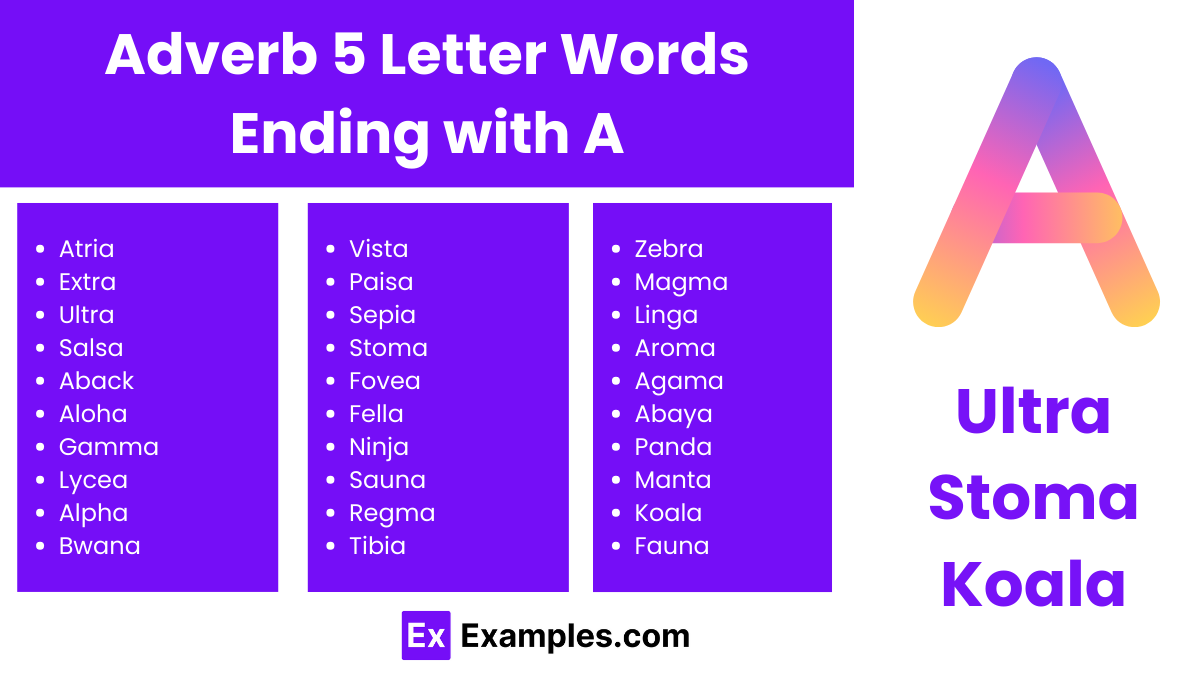
Adverbs that are 5 letters long and end with “a” presents a unique challenge, as adverbs in English rarely fit this precise format. Traditional adverbs modify verbs, adjectives, or other adverbs and usually describe how, when, where, or to what extent an action is performed, often not conforming to such specific structural constraints.
However, to provide valuable content and align with your request as closely as possible, I can offer a creative take by presenting words that could be used adverbially in certain contexts or languages, or that carry an adverbial sense, even if they might not be classified as standard adverbs in English. This approach stretches conventional categorizations to explore linguistic possibilities within the given constraints.
- Atria – In the central room (used metaphorically).
- Extra – Beyond the usual extent or amount.
- Ultra – To an extreme degree; beyond normal.
- Salsa – In the style of salsa music or dance.
- Aback – Taken by surprise (usually part of the phrase “taken aback”).
- Aloha – With a friendly and welcoming attitude (from Hawaiian).
- Gamma – In the third position in a series.
- Lycea – In a manner relating to a lyceum or place of learning (plural of “lyceum” used adverbially).
- Alpha – In the first place or primarily.
- Bwana – With authority or respect (from Swahili, used in English contexts to denote authority).
- Vista – With a view, especially a pleasing one.
- Paisa – With small value or increment (used in South Asian contexts).
- Sepia – In a brownish tone, especially in photography or art.
- Stoma – In a manner relating to a mouth or opening (used in botanical or medical contexts).
- Fovea – With focus on a central point (used in anatomical contexts).
- Fella – In a casual or informal manner (colloquial, often used in dialects).
- Ninja – With stealth or secrecy, like a ninja.
- Sauna – In a hot and steamy manner, reminiscent of a sauna experience.
- Regma – In a manner relating to a fruit that breaks into pieces (botanical term used adverbially).
- Tibia – In relation to the larger bone of the lower leg.
- Zebra – In a striped or patterned manner.
- Magma – In a manner related to molten rock beneath the Earth’s surface.
- Linga – In a manner associated with a symbolic representation of Shiva (from Sanskrit, used in religious contexts).
- Aroma – With a distinctive smell.
- Agama – In a manner related to certain lizards or scriptures (used in zoological or religious contexts).
- Abaya – In the style or manner of an abaya (a loose-fitting, full-length robe worn by some Muslim women).
- Panda – In a manner characteristic of pandas, often implying a gentle or docile nature.
- Manta – In a manner related to a manta ray, often implying gracefulness in water.
- Koala – In a manner characteristic of koalas, possibly implying lethargy or calmness.
- Fauna – In a manner related to the animals of a particular region.
Phrasal Verbs including 5 Letter Words Ending with “A”

Creating a list of phrasal verbs ending with “A” and consisting of 5 letters is a unique request. Phrasal verbs typically consist of a verb followed by a preposition or adverb, making this a challenging criterion to fulfill. However, for the purpose of this task, let’s consider verbs that could potentially be used in phrasal or idiomatic expressions:
- Play a – To engage in playing an instrument or game.
- Bear a – To carry or endure something.
- Wear a – To have on one’s body as clothing or an accessory.
- Read a – To interpret or understand written text.
- Give a – To present voluntarily without expecting compensation.
- Take a – To lay hold of something with one’s hands.
- Send a – To cause to go or be taken to a particular destination.
- Find a – To discover by chance or effort.
- Meet a – To come into the presence or company of someone by chance or arrangement.
- Join a – To connect or link something with another thing.
- Pass a – To move past or across; leave behind.
- Make a – To engage in creating or constructing something.
- Hold a – To grasp, carry, or support with one’s arms or hands.
- Cast a – To throw something forcefully in a specified direction.
- Kick a – To strike or propel forcibly with the foot.
- Flip a – To turn over or cause to turn over with a sudden sharp movement.
- Grab a – To seize suddenly or roughly.
- Park a – To place or leave a vehicle in a designated spot.
- Drop a – To let or make something fall vertically.
- Cook a – To prepare food by heating it.
- Hang a – To suspend or be suspended from above with the lower part not attached.
- Lend a – To grant the use of something on the understanding that it will be returned.
- Love a – To feel deep affection or sexual love for someone.
- Miss a – To fail to hit, reach, or come into contact with something.
- Open a – To move or adjust a door or window so that it is no longer closed.
- Owe a – To be under obligation to pay or repay someone.
- Pack a – To fill a suitcase or bag with clothes and other items.
- Peel a – To remove the outer covering or skin from a fruit, vegetable, or shrimp.
- Rent a – To pay someone for the use of something, typically property, land, or a car.
- Ride a – To sit on and control the movement of an animal, especially a horse.
Describing 5 Letter Words Ending with “A”
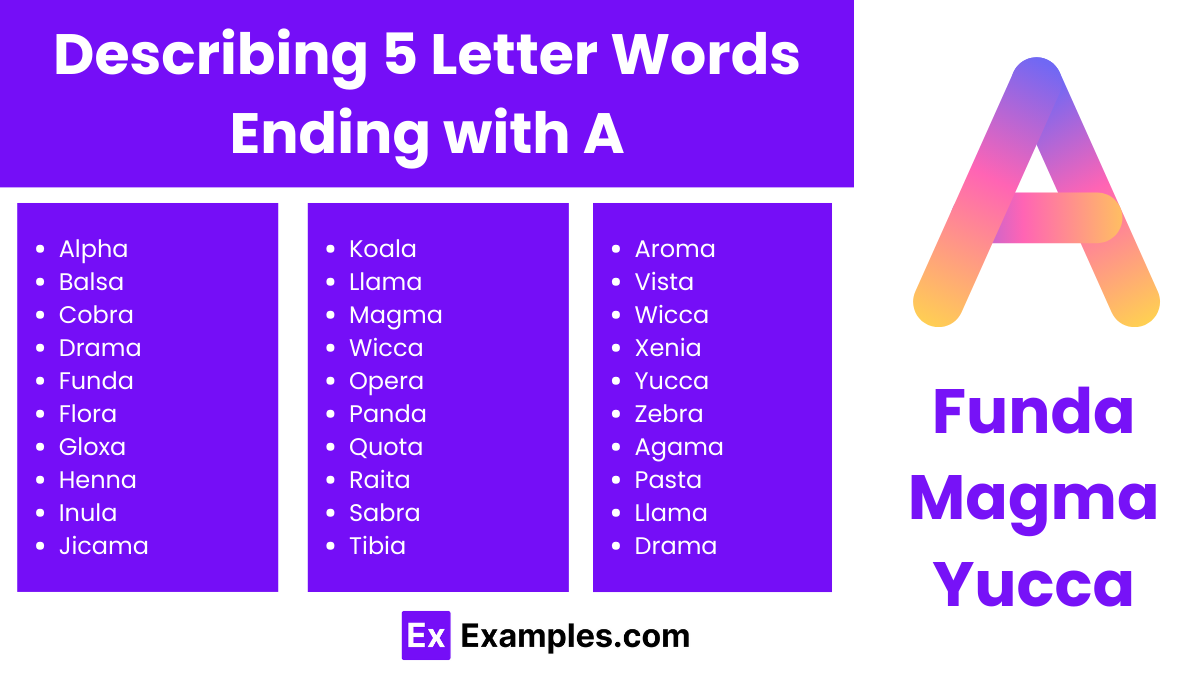
Enhancing vocabulary is a key element in educational development, especially for students preparing for exams or looking to improve their communication skills. This list of descriptive 5-letter words ending with “A” is specifically curated for educators. Each word is selected for its uniqueness and potential to enrich students’ linguistic repertoire. A concise definition follows each term, aimed at fostering comprehension and retention.
- Alpha – The first letter of the Greek alphabet, often used to denote the first or primary in a series.
- Balsa – A lightweight wood from tropical American trees, commonly used in model-making and raft building.
- Cobra – A venomous snake known for its hooded appearance and lethal bite.
- Drama – A genre of narrative fiction (or semi-fiction) intended to be more serious than humorous in tone.
- Funda – Informal term for fundamental principles or facts.
- Flora – The plants of a particular region, habitat, or geological period.
- Gloxa – A term used in botany, referring to the tongue-like or lobed structure of some plants.
- Henna – A reddish-brown dye made from the leaves of the henna plant, used for coloring hair and skin.
- Inula – A genus of flowering plants in the daisy family known for their large and showy flowers.
- Jicama – A bulbous root vegetable with starchy white interior and a sweet, nutty flavor.
- Koala – A tree-dwelling marsupial native to Australia, known for its distinctive appearance and eucalyptus diet.
- Llama – A domesticated South American camelid, widely used as a meat and pack animal by Andean cultures.
- Magma – Molten rock beneath the earth’s surface from which igneous rock is formed by cooling.
- Wicca – A modern pagan witchcraft religion.
- Opera – A dramatic art form in which singers and musicians perform a dramatic work combining text and musical score.
- Panda – A large bear-like mammal with characteristic black and white markings, native to certain mountain ranges in China.
- Quota – A prescribed number or percentage that defines a limited or fixed amount of something.
- Raita – An Indian side dish made with yogurt, spices, and finely chopped vegetables or fruits.
- Sabra – A native-born Israeli, derived from the Hebrew name for a prickly pear cactus.
- Tibia – The inner and typically larger of the two bones between the knee and the ankle in vertebrates.
- Aroma – A distinctive smell
- Vista – A pleasing view, especially one seen through a long, narrow opening.
- Wicca – A modern pagan witchcraft religion.
- Xenia – The effect of pollen on the seeds and fruit of the plant that receives it, used especially in agriculture and horticulture.
- Yucca – A genus of perennial shrubs and trees in the family Asparagaceae, known for their rosettes of evergreen, tough, sword-shaped leaves.
- Zebra – An African wild horse with distinctive black-and-white striped fur.
- Agama – A genus of long-tailed, insectivorous Old World lizards.
- Pasta – A dish originally from Italy consisting of dough made from durum wheat and water
- Llama – A domesticated South American mammal with long legs and a long neck, related to the camel but smaller and lacking a hump.
- Drama – A composition in prose or verse presenting a story with conflict, intended to be acted on the stage; a play.
Positive 5 Letter Words Ending with “A”
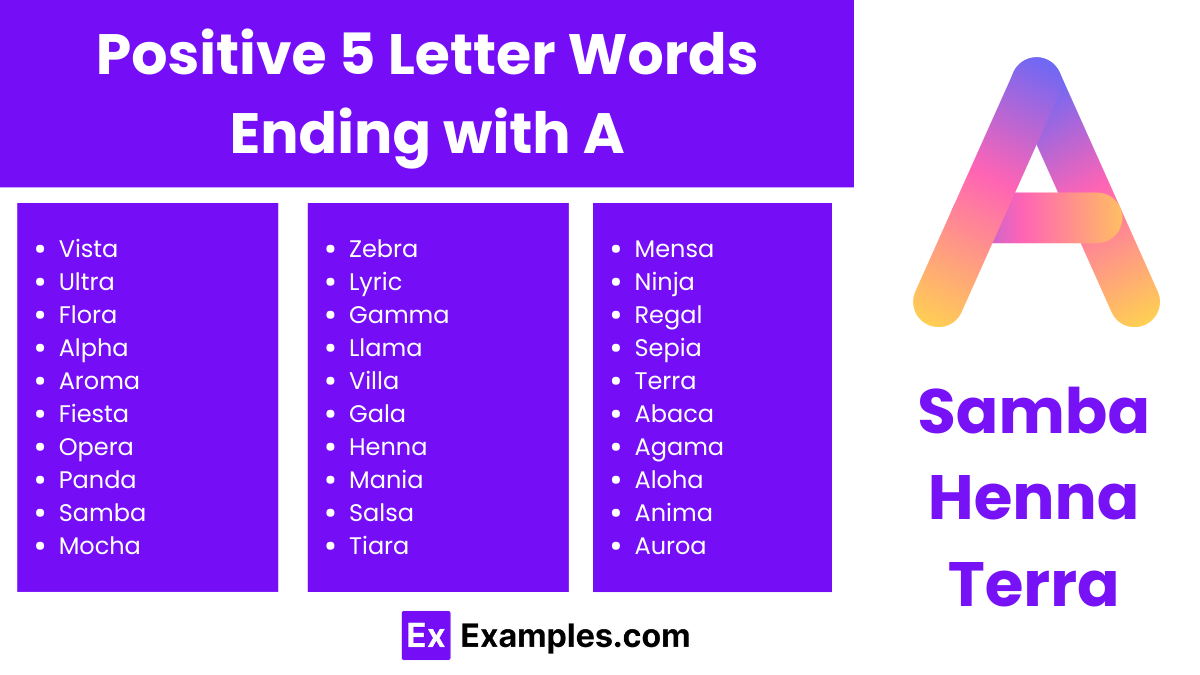
Embracing positivity through language can significantly uplift spirits and inspire a constructive mindset. The following compilation of 5-letter words ending with “A” is imbued with positivity, each carrying a ray of optimism, encouragement, or joy. Educators can integrate these luminous terms into their teaching methodologies to foster a positive learning environment, stimulate creative thinking, and encourage students to express themselves in a hopeful and affirmative manner.
- Vista – A pleasing view, especially one seen through a long, narrow opening.
- Ultra – Going beyond what is usual or ordinary; extreme.
- Flora – The plants of a particular region, habitat, or geological period.
- Alpha – The first; typically denotes being the first or primary in importance.
- Aroma – A pleasant and distinctive smell.
- Fiesta – A festival or religious holiday, especially a lively one.
- Opera – A dramatic work combining text and musical score for the theater.
- Panda – A large bear-like animal known for its distinctive black and white coloring.
- Samba – A lively dance of Brazilian origin.
- Mocha – A coffee drink with chocolate, invoking a sense of warmth and comfort.
- Zebra – A wild animal known for its distinctive black and white stripes, symbolizing individuality.
- Lyric – Expressing the writer’s emotions in an imaginative and beautiful way.
- Gamma – The third letter of the Greek alphabet, often representing the third in a series.
- Llama – A domesticated pack animal of the Andes known for its soft wool.
- Villa – A luxurious country residence or estate.
- Gala – A festive celebration or party.
- Henna – A reddish-brown dye used especially for coloring hair or skin.
- Mania – An excessive enthusiasm or desire; often used in a positive context for hobbies.
- Salsa – A type of Latin American dance music incorporating elements of jazz and rock.
- Tiara – A jeweled ornamental band worn on the front of a woman’s hair.
- Mensa – A society for individuals with a high IQ, symbolizing intelligence and achievement.
- Ninja – A person skilled in ninjutsu, often admired for agility and stealth.
- Regal – Resembling, or fit for a monarch; royal.
- Sepia – A reddish-brown color associated with nostalgic and warm photographic tones.
- Terra – Referring to the earth or land, evoking a sense of grounding and stability.
- Abaca – A fiber from the banana family, known for its strength and used in textiles.
- Agama – A type of lizard known for its bright colors and adaptability.
- Aloha – A Hawaiian greeting or farewell, expressing love, peace, and compassion.
- Anima – In Jungian psychology, the inner self that is in touch with the unconscious.
- Auror – Inspired by “aurora,” the natural electrical phenomenon characterized by the appearance of streamers of reddish or greenish light in the sky, symbolizing wonder and beauty.
SAT 5 Letter Words Ending with “A”

Enhancing vocabulary is pivotal for students preparing for the SAT, as it not only aids in acing the exam but also bolsters communication skills. For educators seeking to assist fellow teachers and enrich students’ learning experience, introducing distinctive and SAT-relevant words can be incredibly beneficial. This compilation of unique 5-letter words ending in “A,” complete with concise definitions, is tailored to help teachers engage students in expanding their vocabulary horizons.
- Vista – A broad view or outlook
- Lyssa – Madness; used in literary and historical contexts
- Tibia – A large bone in the lower leg
- Sofia – The capital city of Bulgaria
- Rumba – A dance of Cuban origin
- Quota – A fixed share or portion
- Pasta – A type of Italian noodle dish
- Omega – The last letter of the Greek alphabet
- Ninja – A member of a feudal Japanese society of mercenary agents, highly trained in martial arts
- Mocha – A coffee drink with chocolate
- Lycea – Ancient Greek or Roman buildings used for intellectual activities
- Koala – An Australian marsupial
- Junta – A military or political group that rules a country after taking power by force
- Ibiza – An island in the Mediterranean Sea, part of Spain
- Hyena – A carnivorous mammal
- Gauza – A thin, translucent fabric used for clothing
- Fovea – A small depression in the retina of the eye
- Extra – Beyond what is due, usual, expected, or necessary
- Drama – A play for theater, radio, or television
- Copra – Dried coconut kernels from which oil is obtained
- Bwana – A respectful term used in East Africa to address or refer to a man
- Aurora – A natural light display in the Earth’s sky, predominantly seen in high-latitude regions
- Asana – A posture adopted in performing hatha yoga
- Agora – A public open space used for assemblies and markets in ancient Greece
- Afrit – A powerful jinn or demon in Arabian and Muslim mythology
- Aecia – Fruiting bodies of certain rust fungi
- Abaca – A large herbaceous Philippine plant of the banana family
- Kappa – A letter of the Greek alphabet
- Gamma – The third letter of the Greek alphabet
- Flora – The plants of a particular region, habitat, or geological period
In conclusion, exploring 5-letter words ending with ‘A’ offers a linguistic journey through diverse fields, enriching vocabulary and understanding. These words, embodying concepts, actions, and descriptions, serve as essential tools for effective communication. For educators and students alike, mastering these terms enhances expressive abilities, making language not just a medium of instruction but a bridge to broader horizons and deeper connections.


